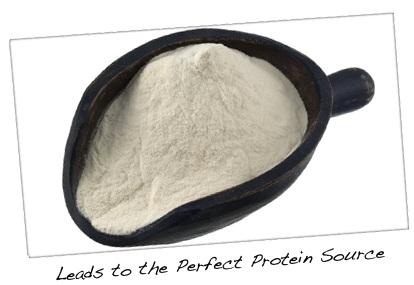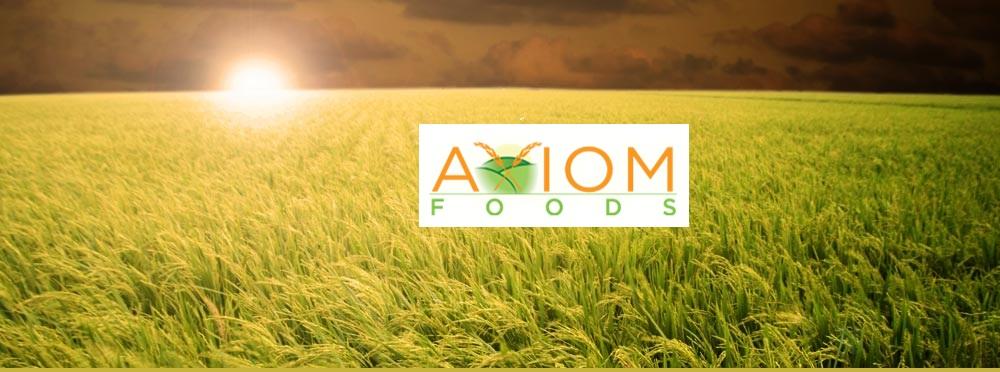Axiom Foods-Whole Grain Brown Rice Protein
Setting record straight about our original organic brown Rice Protein (limit reference to raw and sprouted) including:

o 100x or more production than anyone else.
o Set the bar on quality including the first organic, hexane-free, EU certified, melamine-free brown rice protein, extracted from all the layers.
o The only research-based rice protein.
ABOUT PEA PROTEIN
• Tripling pea protein production due to increased popularity, functionality and applications.
The facts speak for themselves…
• Named One of the Hottest Ingredients & Top 10 Functional Food Trends for 2013
Protein sales up 33% in 2012 (Functional Ingredients Magazine & IFT Wellness)
• Major Shift Toward Plant-Based Proteins (due to increasingly higher costs and shortage of animal protein (USDA)
• 4 in 10 Consumers Eating More Protein
• Number of vegans doubled in last 2 years (Google Trends)
• 30-40% in U.S. Flexitarians and Growing
Consumers who enjoy meat but occasionally opt out due to concerns about personal health and environmental impact (Innova Market Insights, 2012 & QSRWeb.com, 2011)
• 39% Say high-protein label claims are important (Mintel)
• #3 nutrient consumers are looking to consume
#1 Fiber (56%), #2 Whole Grains (56%), #3 Protein (48%) (Intl Food Information Council’s 2012 Food & Health Survey)
• #5 Most Important Component of Healthy Eating
Behind vegetables, fruits, limited processed foods and low saturated fats (Mintel)
THE METAL PROBLEM
• Axiom is on a mission to educate consumer about the facts and fictions regarding heavy metals in a plant based diet.
• The problem with any metals, beneficial or not, is when the substance reaches toxic levels in the body. The question is: what is considered to be toxic and what testing methods are certified to determine toxicity?
• How results are presented is crucial to convey what’s really going on. What happens when test results are reported as parts per million vs parts per billion? Unnecessary panic sets in
• Testing for contamination in food products needs to be done in accredited laboratories in the United States, where standards for calibration exist and highly-educated practitioners test with accepted scientific methodologies. Test results can vary vastly based on seemingly insignificant factors. In April, 2013, Dr. Tongesayi of Monmouth University, released a study showing he’d found levels of metal that exceeded FDA safety limits. It turned out he recalled his tests because his instruments were not calibrated.
• Standards for levels of metals are set by World Health Organization (“WHO”), The European Union, The Canadian Natural Health Products Directorate, the US FDA (tolerable daily intake), US Pharmacopeia, US EPA (drinking water) and California’s Proposition 65 in the State of California.
THE TRUTH ABOUT METALS

• Heavy metals, such as arsenic, cadmium and lead are found in all plants that grow in healthy soil because they are natural constituents of the Earth’s crust and have existed on earth since its formation.
• Some metals, such as iron, copper, chromium, cobalt, manganese, molybdenum, zinc and some organic arsenic are required by the human body as essential nutrients. Naturally, any metal in the soil or surrounding bodies of water will leech into any plant we consume. This environmental exposure impacts both organic and conventionally grown crops.
• We consume metals in common plant foods daily, from spinach to spices. Any metal, including those that are essential to the body to function can even cause toxicity if introduced at high levels.
• Just because a food contains a certain level of metal does not mean the body will absorb or retain it. Several factors dictate the absorption and retention of metals. The Agency for Toxic Substances and Disease Registry states, for example, only 2-6% of cadmium ingested is absorbed.
• Some plants that grow in water, such as rice, spinach and asparagus, are often targeted as contaminated by heavy metals because some crops have been found to be in polluted areas of the world. This is well known by efficacious growers and manufacturers and as such they consciously choose pristine fields far from polluted areas and regularly test in specifically certified laboratories to ensure levels are way below what is considered to be toxic. In China, for example, one polluted field cited in the news recently was 3000 miles away from where Axiom has sourced some rice on the Himalayan border of Tibet, among many other fields worldwide.
WHY PLANT BASED PROTEINS ARE SIGNIFICANT
• The benefits for plant-based protein outweigh the negatives. Approximately 50 million people in the US are allergic or intolerant to dairy and 1 in 133 Americans suffer from allergies to wheat gluten, according to the National Foundation of Celiac Awareness; many plant-based proteins are allergen-friendly aside from soy protein.
• According to the Journal of the American Medical Association, vegans are shown to live longer.
WHY AXIOM IS A PLAYER
• The FDA has yet to set levels for heavy metals in rice, but has used Axiom Food’s technology as the standard for responsible sourcing, fractioning and manufacturing of rice protein. Axiom’s Oryzatein® is in the process of becoming the first GRAS certified Rice Protein, which will lead toward it becoming the world’s first FDA monographed standard for the entire industry. Oryzatein® was also used in the first double blind clinical trial that showed it equals animal-based whey in building and repairing muscle.


